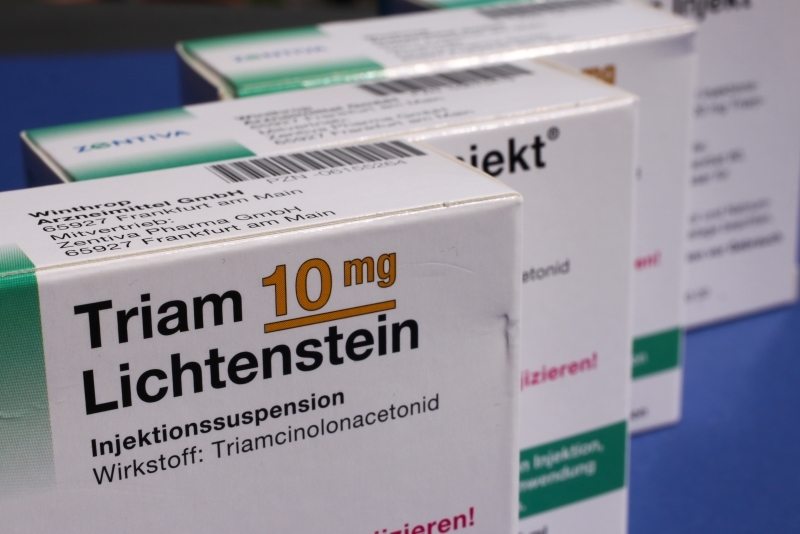Joint replacement is a standard surgical procedure for arthritis. Knee replacement is the most common, followed by hip and shoulder. Usually, these replacement surgeries are performed on more severe forms of arthritis that have failed conservative treatments. These other treatments include cortisone, hyaluronic acid, and platelet-rich plasma injections. Recent evidence suggests that some injections may increase infection risk if performed too close to replacement surgery. So, should you be concerned about infection risk and how long to wait for knee surgery after a cortisone shot? We will also answer the question: How long after a cortisone shot can I have surgery?
Cortisone for arthritis
We use cortisone injections to reduce pain and swelling associated with arthritis. Cortisone is a drug that mimics the natural cortisol hormone produced by your adrenal glands. Cortisol reduces inflammation but also powerfully suppresses the immune system.

Why does cortisone increase the risk of infection?
We are not entirely sure. However, we have a few theories. First, cortisone is a powerful immune system suppressant and can reduce the body’s ability to fight infection. So, after surgery, if cortisone is still present in the joint, the risk of infection may be increased. Second, we know that cortisone reduces wound healing, potentially impairing recovery after surgery and increasing infection risk.
Evidence of infection risk after cortisone shot
Many studies have linked cortisone injections with an increased risk of infection after a knee or hip replacement. However, these studies are observational, meaning they have less evidence of proof and are more prone to errors.
However, systematic reviews have recently assessed this risk more carefully. Generally, systematic reviews group studies together, meaning they have better, more robust evidence.
A recent systematic review of total knee replacements examined over 300,000 knee replacement patients. Nearly half of these patients had a cortisone injection before their knee replacement. The alarming results suggest that a cortisone injection before a total knee replacement increases the risk of infection after surgery. This risk is high if the injection is performed within six weeks of surgery. The risk of infection remains higher when cortisone injections are done within three months of surgery.
Similar data is found in hip replacements. There is a higher risk of infection if a cortisone injection is given within three months of a hip replacement.
How soon after cortisone shot can I have surgery?
So, based on recent studies, you should avoid having a cortisone injection within three months of surgery. However, to be safe, many practitioners suggest waiting at least six months for surgery after a cortisone shot.
Other frequently related questions after a cortisone shot and surgery:
How long do you wait for knee surgery after a cortisone shot?
We think that you should wait six months for knee surgery after a cortisone shot. Recent studies suggest that the risk of infection is increased to 3 months and possibly up to six months. Also, the risk is not just for knee replacement. To be safe, we think you should wait six months to have knee surgery after a cortisone shot.

Does a cortisone injection increase the risks of shoulder surgery?
Maybe. A recent study suggests that a cortisone shot within one month of a rotator cuff repair increases the risk of post-surgical infection.
Does a cortisone shot increase the risks of hand surgery?
Maybe. Some studies have shown an increased risk of post-operative infection if a cortisone injection is performed within three months of hand surgery.
Do PRP or hyaluronic acid injections increase the risk of infection pre-surgery?
We don’t know. However, we don’t think so, as there is no evidence to suggest that viscosupplementation or PRP before surgery increases the risk of infection after surgery. However, it makes sense to play it safe and be cautious. Some surgeons recommend waiting for six months after viscosupplementation or PRP injection before proceeding with surgery.
What other pain-control options are available for arthritis before surgery?
Strengthening exercises, knee splints, taping, and orthotics can help with pain from knee and ankle arthritis. Topical medications such as ibuprofen gel and capsaicin cream can help. Oral ibuprofen or other NSAIDs have shown effectiveness in reducing pain associated with arthritis, although you need to be aware of side effects. Other pain-relieving medications for osteoarthritis include duloxetine.
Final word from Sportdoctorlondon about how soon after cortisone shot can you have surgery
The results suggest that a cortisone injection close to a hip or knee joint replacement increases the risk of infection after surgery. So, it would be best if you considered avoiding a cortisone shot within six months of planned surgery. Hyaluronic acid, or PRP, seems less risky, although you should check with your surgeon.
Related conditions:
- Are cortisone injections bad for you?
- How long does it take for a cortisone shot to work?
- Do you need to rest after a cortisone injection?
- How long does a steroid injection last?
- Cortisone vs hyaluronic acid injection: which is best?
- Do cortisone shots cause weight gain?



Leave A Comment